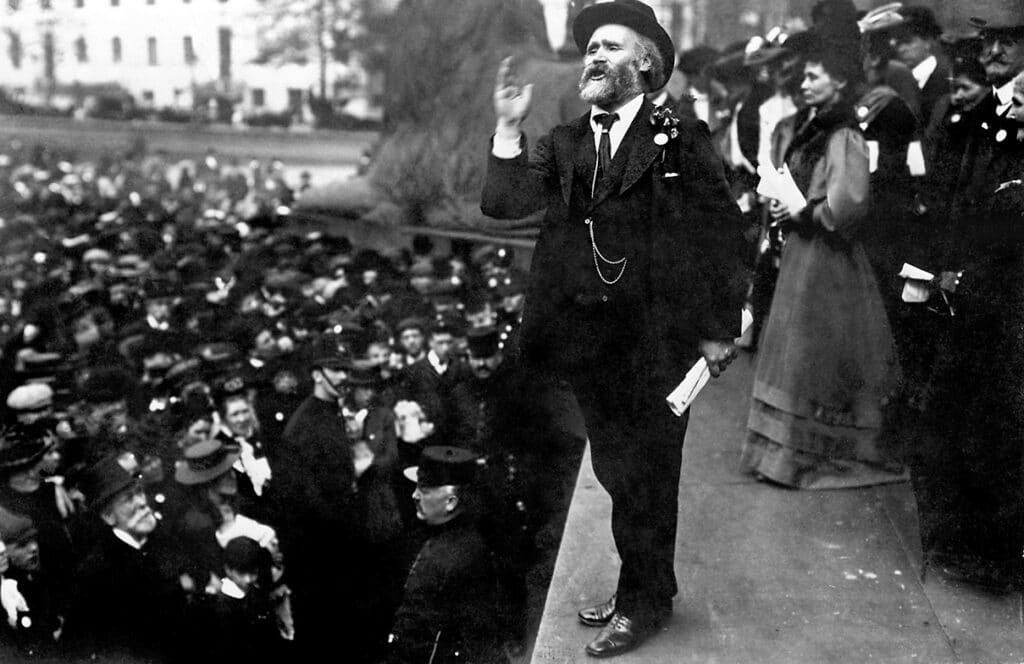
There is an old Russian communist joke that goes something like this: a local communist meeting is taking place in a village outside Moscow and the party leaders are attending, to indoctrinate the local peasants. The leader asks the assembled crowd, ‘If you had ten cows what would you do?’ One of the peasants replies correctly, ‘If I had ten cows, I would keep five cows and give the other five to the party for redistribution’. The leader asks another question to a different man, putting it to him, ‘If you had ten pigs what would you do?’ The other man promptly responds, ‘I would keep all the pigs’. When the party leader asks him why he would do such a thing, the man simply replies, ‘because I have ten pigs’.
The moral of the tale is that people tend to support political and government systems when they feel they can benefit from them. Paraphrasing John Adams, one of the founding fathers of the USA, ‘If you’re not a liberal when you’re 25, you have no heart. If you’re not a conservative by the time you’re 35, you have no head.’ This has always been the trouble for the left. How do they hang onto voters, once their voters’ circumstances have been improved? This is the tricky tightrope balancing act that Sinn Fein are currently engaging in. In opposition, without control of the state’s purse strings nor power to implement legislation, it is easy to demand grand socialist schemes: houses for those without, more money to pay electricity bills, more medical cards for low income workers. Those with more, pay more. It’s all very economically appealing when caught in a ‘cost of living’ storm. The question remains, do you continue to support such policies when you no longer become a benefactor of the system but become the net contributor as you later advance in life? This has always been the problem faced by socialist leaning parties. Throughout the history of socialist revolutions, be it Russia, Spain, Cuba, Venezuela, the aim is to appeal to the less well off, the masses of workers who create the money but never receive the profits. Astonishingly, those who are lower down in the economic strata, can often become more conservative than the conservatives themselves. Brexit illustrated this when many first generation immigrants supported it, in the belief that future immigrants would compete for their jobs if Britain remained in the EU. It was a masterful stroke of misinformation and fear stoking by Boris and co that secured large chunks of working class vote to get Brexit over the line. Remember it was the Irish Immigrants working on the docks of New York that rioted when the slaves were emancipated.
I want to look at a major turning point in political history – the creation of the Labour party in the UK at the turn of the 20th century. Since Britain first introduced a very limited monarchical parliament in the 15th century, only the very rich, powerful and landed, spoke for the rest of the people. And though the enfranchise was gradually widened over the ensuing centuries, it was never great enough to include most men and women that could tip the balance in favour of the ‘common hordes’. This changed after the Great War when, the ‘Representation of the People Act of 1918’ granted the vote to women over the age of 30 who met a property qualification or were married to registered male voters, and the vote to all men over the age of 21. With the stroke of a pen, there were now more working class voters in the UK than middle or upper class ones. It had always puzzled me why the Labour Party, the party of the working classes, was not swept into power by the wave of new of voters that had been unleashed onto the voting register? They did first achieve political success in the 1920s, but it was both brief and unsuccessful minority governments under Ramsey McDonald. It wasn’t until Clement Attlee from 1945-51, the Labour regained power creating the National Health Service, and improving social services to take people out of poverty. And that’s the rub. People’s lives improved and yet Labour had to wait until 1974 to govern again.
Let’s look at the reasons why Labour failed to dominate the political landscape, despite having claimed to represent the majority of people on the island, from a class perspective, from 1918.
The first thing to acknowledge is that the Liberal Party, which had been in existence since 1859, was the main opposition party to the Tories. Their membership and party stemmed from self-made men, as opposed to the landed classes and old money. They also appealed to the growing but small middle class voter of the 19th century. They had of course been responsible for the heralding in of the old age pension and other measures that meant they had some appeal to people less off than the Conservative Party core membership. Labour was often in battle with liberal candidates at the polls, as much as it was with Conservatives ones, thus in many cases their vote was split. In the British ‘first past the post’ system, the Conservatives benefitted as long as Liberal and Labour stood against each other.
The fact that labour was founded in 1900, and that MPs were only paid from 1911, also meant that before 1918, Labour had precious little time to create a political machine on an even keel to the others. What good is having a body of voters behind you, if you don’t have enough candidates to tap into it? Ultimately, promising Labour politicians up to 1911, had to get funded by trade union dues, even to just get to the starting line. The Conservatives and Liberal politicians were wealthy men of inheritance, land or enterprise. A working class candidate was a rare thing.
The Labour party in its infancy also made a few fundamental mistakes that certainly alienated even working class voters from giving them support. The industrial union had created a world where towns and cities grew exponentially and rural towns became depopulated. Few millionaires were made in big industry, made possible by the low waged and hard worked employees. On the surface, one would think from 1918, that it would be a simple matter of tapping into the disgruntled man and woman. Keir Hardie and other Labour politicians saw firsthand the devastating effect of alcohol on the working class and campaigned hard on a teetotaling ticket, promising laws that would curtail the wicked liquor that had devastated so many working class lives. On the surface, this makes sense and morally was a just crusade. In reality, the working classes of the early 20th century, with little else to elevate the drudgery of their hard lives outside of alcohol and gambling; saw getting rid of alcohol as an anathema to them rather that a cure to their poverty. Conservative candidates and capitalists with vested interests in brewing and alcohol, preached a different tune and thus many working classes voted conservative rather than voting a dry Labour Candidate. The Conservatives (like the republicans in modern USA, were also very good at tapping into working class patriotism). Wars create xenophobia and many working class voters were lulled into supporting imperialist Britain, under the pretence of keeping British goods and markets strong, to prevent the cost of living going up. Thatcher repeated the trick in 1982, with her ludicrous Falkland war campaign, which kept her in power for another term.
Labour also missed a trick, failing to tap into a massive reservoir of potential voters – women. The suffragettes, in their attempt to make a splash and bring attention to the cause of women suffrage, began violent campaigns, arson attacks and hunger strikes. Instead of whole-heartedly supporting them (at that stage women could not vote and maybe this was part of the reason) many Labour candidates condemned them like most of the male politicians. It seems the traditional nature of Edwardian England was not ready for strong female voices. There were exceptions of course, most significantly future Labour Prime Minister Ramsey McDonald who crossed the floor in a fit of rage, condemning the government’s force feeding of the female prisoners. He wasn’t alone, but Labour never formed a unified front to support the suffragettes, something that was remembered in 1918, when many of the newly- enfranchised women voted with their class. It was a missed opportunity by Labour that could have garnered universal female support otherwise.
A major factor that can’t be discounted was that many people feared ‘socialism’. The bloody and murderous Russian revolution in 1917 had devastated that country. Socialism was still a relatively new political concept and was often associated with Marxism or Communism. It was hard for Labour the get its messaging right and it didn’t help that many candidates were outspoken in favour of hard socialism. Having an ill-defined manifesto is of course the most damaging aspect of any party, as voters need a clear indication of what they are supporting. Even today, American Republicans and British Conservatives represent low tax regimes, protectionism and a hawkish patriotism. It’s not everyone’s cup of tea, but its appeal is in its clear and transparent messaging. The left continues to have mixed signals and even in Ireland remains splintered and divided, despite the vast sways of people who could benefit from their policies.



